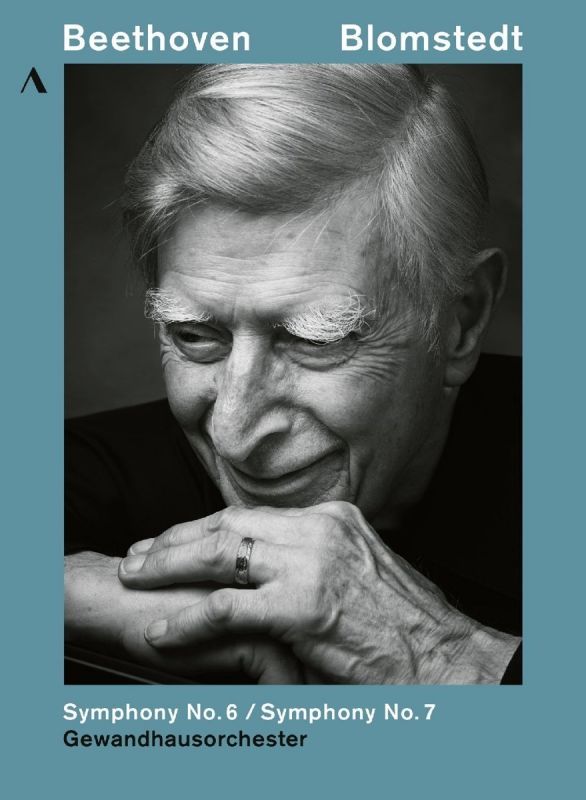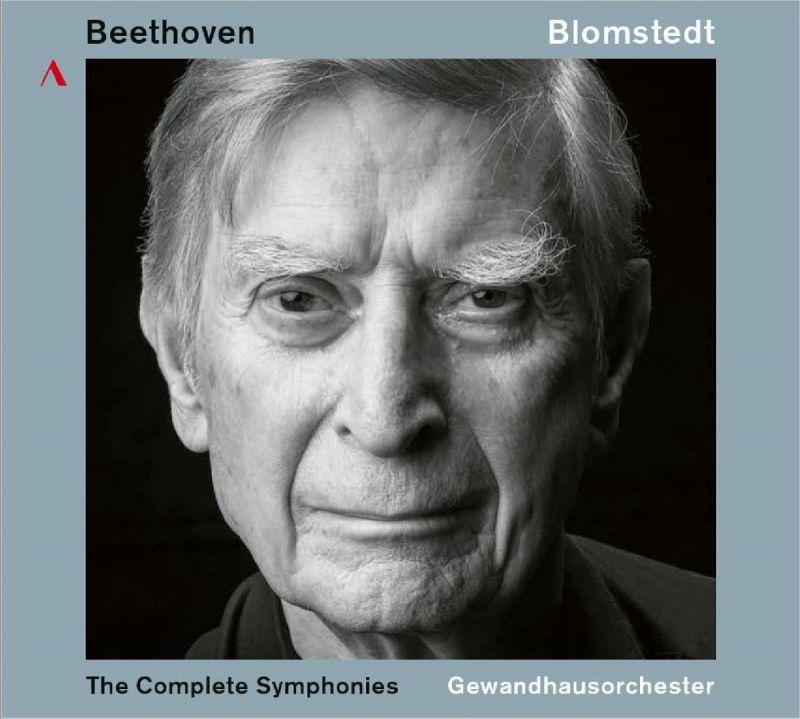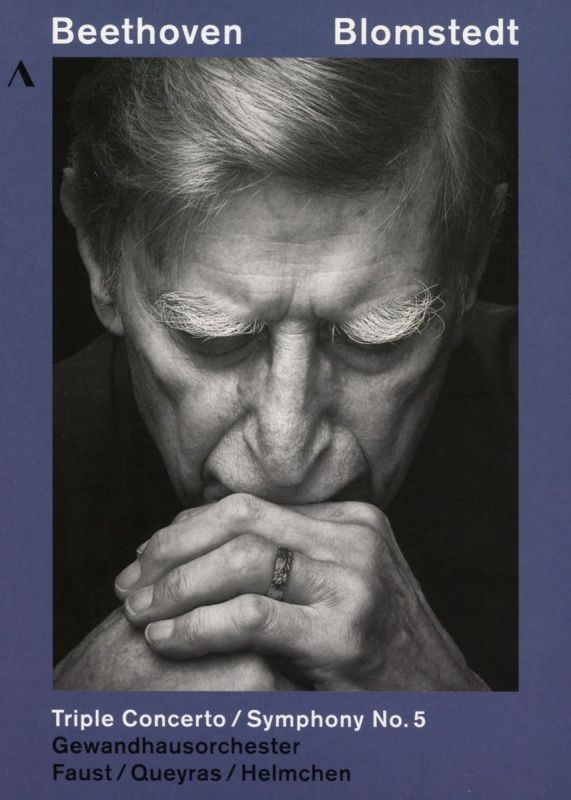BEETHOVEN Complete Symphonies (Blomstedt)
View record and artist detailsRecord and Artist Details
Composer or Director: Ludwig van Beethoven
Genre:
Orchestral
Label: Accentus
Magazine Review Date: AW17
Media Format: Digital Versatile Disc
Media Runtime: 92
Mastering:
DDD
Catalogue Number: ACC20413

Tracks:
| Composition | Artist Credit |
|---|---|
| Symphony No. 6, 'Pastoral' |
Ludwig van Beethoven, Composer
Herbert Blomstedt, Conductor Leipzig Gewandhaus Orchestra Ludwig van Beethoven, Composer |
| Symphony No. 7 |
Ludwig van Beethoven, Composer
Herbert Blomstedt, Conductor Leipzig Gewandhaus Orchestra Ludwig van Beethoven, Composer |
Composer or Director: Ludwig van Beethoven
Genre:
Orchestral
Label: Accentus
Magazine Review Date: AW17
Media Format: CD or Download
Media Runtime: 349
Mastering:
DDD
Catalogue Number: ACC80322

Tracks:
| Composition | Artist Credit |
|---|---|
| Symphony No. 1 |
Ludwig van Beethoven, Composer
Herbert Blomstedt, Conductor Leipzig Gewandhaus Orchestra Ludwig van Beethoven, Composer |
| Symphony No. 2 |
Ludwig van Beethoven, Composer
Herbert Blomstedt, Conductor Leipzig Gewandhaus Orchestra Ludwig van Beethoven, Composer |
| Symphony No. 3, 'Eroica' |
Ludwig van Beethoven, Composer
Herbert Blomstedt, Conductor Leipzig Gewandhaus Orchestra Ludwig van Beethoven, Composer |
| Symphony No. 4 |
Ludwig van Beethoven, Composer
Herbert Blomstedt, Conductor Leipzig Gewandhaus Orchestra Ludwig van Beethoven, Composer |
| Symphony No. 5 |
Ludwig van Beethoven, Composer
Herbert Blomstedt, Conductor Leipzig Gewandhaus Orchestra Ludwig van Beethoven, Composer |
| Symphony No. 6, 'Pastoral' |
Ludwig van Beethoven, Composer
Herbert Blomstedt, Conductor Leipzig Gewandhaus Orchestra Ludwig van Beethoven, Composer |
| Symphony No. 7 |
Ludwig van Beethoven, Composer
Herbert Blomstedt, Conductor Leipzig Gewandhaus Orchestra Ludwig van Beethoven, Composer |
| Symphony No. 8 |
Ludwig van Beethoven, Composer
Herbert Blomstedt, Conductor Leipzig Gewandhaus Orchestra Ludwig van Beethoven, Composer |
| Symphony No. 9, 'Choral' |
Ludwig van Beethoven, Composer
Christian Elsner, Tenor Christian Gerhaher, Baritone Herbert Blomstedt, Conductor Leipzig Gewandhaus Childrens Choir Leipzig Gewandhaus Chorus Leipzig Gewandhaus Orchestra Ludwig van Beethoven, Composer MDR Rundfunkchor Leipzig Mihoko Fujimura, Mezzo soprano Simona Saturová, Soprano |
Composer or Director: Ludwig van Beethoven
Genre:
Orchestral
Label: Accentus
Magazine Review Date: AW17
Media Format: Digital Versatile Disc
Media Runtime: 92
Mastering:
DDD
Catalogue Number: ACC20411

Tracks:
| Composition | Artist Credit |
|---|---|
| Concerto for Violin, Cello, Piano and Orchestra |
Ludwig van Beethoven, Composer
Herbert Blomstedt, Conductor Isabelle Faust, Violin Jean-Guihen Queyras, Cello Leipzig Gewandhaus Orchestra Ludwig van Beethoven, Composer Martin Helmchen, Piano |
| Symphony No. 5 |
Ludwig van Beethoven, Composer
Herbert Blomstedt, Conductor Leipzig Gewandhaus Orchestra Ludwig van Beethoven, Composer |
Author: Peter Quantrill
In a tantalising interview with Philip Clark (7/17), the conductor makes clear that, 60 years after Igor Markevitch had hammered the principle home, the score is still his bible. But then any other conductor worth the job-title would say the same, and praise of Blomstedt (and a select few European colleagues of his generation) over the years – honest, straightforward, presenting the music as it really is (an especially pernicious illusion) – has given rise to a well-meaning but misguided underestimation of the tens of decisions he and his kind must make, in advance and on the spot, when faced with any given phrase of this music.
Such decisions now take into serious account the wave of period-performance practice. Noticeably swifter than before, Blomstedt’s chosen tempos are still 5‑10 per cent slower than the composer’s metronome marks. It is the proportions between them that matter. That first cycle employed the Dresden Staatskapelle at its most soft-grained. Now, an hour’s train-ride away, he stands in charge of the Leipzig Gewandhaus. Always a tighter-grained ensemble, the orchestra was driven to further heights of muscular agility by Riccardo Chailly in a Decca studio cycle (A/11) of restless and often impatient character. Conducting the symphonies in concert, Chailly allowed himself considerably greater license to roam, and to the benefit of everyone concerned. Under Blomstedt, however, the musicians sound at ease yet always on their mettle. Twenty seconds, no more, separate the finales of the Fourth, but what a difference they make. What was gabbled and jittery under Chailly’s direction now leaps and bounds and sings. If it’s Beethoven the raging tyro you’re after, look elsewhere.
Blomstedt has gauged the weight of each climax in the First – as much as is necessary and no more – so that the symphony stands poised on the threshold between Classical and Romantic expression. Indeed, such retrospective categorisations rather fade to irrelevance – as, in the moment of listening, do hankerings after flicks of impudence in Beethoven the young Turk (this is a cycle full of smiles but no belly-laughs). The Second is occasionally prone to a species of constrained literalism encountered again in a stiff transition from Adagio to Allegro in the Fourth’s opening movement (‘conducting by numbers’, as Richard Osborne observed in portions of the conductor’s Bruckner cycle in Leipzig – Querstand, 11/13), but I relished the unusual proximity of expressive intent between the Mozartian finale of the Second and the Eroica’s lithe exposition, which are so often separated by a gulf of imagined history.
Where possible – for the Fifth, Sixth, Seventh and Ninth – these are performances to be watched, not least for the audio mix, which I find marginally more transparent than on the CD mastering. There is the occasional frown and raised eyebrow from Blomstedt as he comes again to a private understanding with the music, not in gestures of censure. More often he is wreathed in beatific smiles, and his musicians appear uncommonly happy with their lot. The Pastoral breathes contentment, with a spring in the step of the first movement that admits all the necessary space for anticipation, excitement and the passing joy of moments such as the chuckling clarinet and bassoon figures. The timpanist’s Storm intervention makes hardly less terrible or striking an impact than on the most athletic or idiosyncratic readings (by, say, Carlos Kleiber or Mikhail Pletnev), yet the symphony is crowned by a glow of horns in the coda to rival Furtwängler’s valedictory account from 1954. In the Andante con moto of a particularly cogent Fifth, the pianistic nature of Beethoven’s inspiration comes over strongly, with the Leipzig strings pressing into the rising-falling theme of scale-fragments and murmuring left‑hand accompaniment as if into the keybed of a Broadwood.
The virtues of the Ninth have been rehearsed here before (3/17); applause is excised from the CD version as it is throughout the set. The concert-film of the Fifth is preceded by a Triple Concerto in which Blomstedt thins out the ensemble to offer lively support to his soloists; in turn, Isabelle Faust sweetens her tone in graceful complement to the Leipzig sound.
Discover the world's largest classical music catalogue with Presto Music.

Gramophone Digital Club
- Digital Edition
- Digital Archive
- Reviews Database
- Full website access
From £8.75 / month
Subscribe
Gramophone Full Club
- Print Edition
- Digital Edition
- Digital Archive
- Reviews Database
- Full website access
From £11.00 / month
Subscribe
If you are a library, university or other organisation that would be interested in an institutional subscription to Gramophone please click here for further information.




